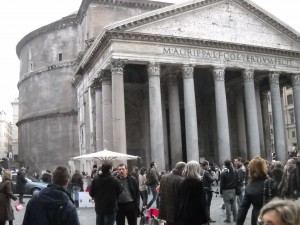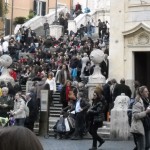The Keats-Shelley House

Pantheon
The Pantheon is larger than one might imagine and truly surreal. Rome has been called the Eternal City for some solid comparative reasons. However, at

base of the Spanish Steps
the base of the Spanish Steps, immediately to the right, there is a multi-level, albeit, modest home known as The Keats-Shelley House. Bob had heard of this place some years ago.  Then, recently, in a visit to Rome, he found it just as predicted. As Bob stood in the room where Keats died and looking out the very window that John must have peered himself many times, he was reminded of an old text from one of the prophets—“All souls are mineâ€Â (Ezekiel 18:4). Whereas, Shelley was lost at sea in Italy, Keats died

room where Keats died
here in Rome of tuberculosis. Both men made lasting literary contributions. Both died relatively young. And both had to leave “the Eternal Cityâ€.
But, the thought that Bob would like to leave here is how he found a young British (not Italian) museum curator knitting away on the second floor of the Keats-Shelley House. There she was in the quiet of that Italian afternoon keeping watch over the literary shrine to the memory of these two British poets. That somehow seemed appropriate (see also Proverbs 15:3).

approaching Spanish Steps